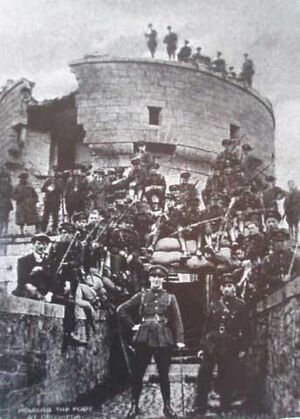Millmount Fort facts for kids
Quick facts for kids Millmount |
|
|---|---|
 |
|
| Former names | Richmond Barracks |
| Alternative names | Cup and Saucer |
| General information | |
| Type | Fortification |
| Address | Millmount |
| Town or city | Drogheda |
| Country | Ireland |
| Construction started | 12th Century CE |
| Owner | Old Drogheda Society |
Millmount is a large, strong fort built on a big hill in Drogheda, County Louth, Ireland. It sits on the south side of the River Boyne. This fort has been very important throughout Drogheda's history.
Millmount played a key role from the time the Normans settled there, through Cromwell's attack, and even during the Irish Civil War in 1922. During the Civil War, the famous Martello tower at Millmount was badly damaged. Today, the fort is home to the Millmount Museum. This museum has many important items from local and national history. Millmount is easy to see from all over Drogheda. Locals often call the Martello tower "The Cup and Saucer." The entire fort is a national monument and is known as Drogheda's Cultural Quarter.
Contents
History of Millmount Fort
Early Beginnings and Norman Times
Millmount has been a fortified place since the early 1100s. This was when the Normans arrived in Ireland. They built a "motte and bailey" castle here. This type of castle had a large earth mound (the motte) with a tower on top, and a fenced area (the bailey) below. Before the Normans, this spot might have been an ancient burial place from the Stone Age, similar to Newgrange. Some old Irish stories suggest it could be the burial site of a legendary poet named Amhairgin.
Hugh De Lacy, a Norman leader, built the first fort around 1172. He was given the area of Meath by King Henry II of England. Later, a stone castle was built on this site. This castle was part of Drogheda's defenses when Oliver Cromwell attacked the town in 1649. The English soldiers defending the fort tried to surrender to Cromwell's army. However, many of them were killed on September 11, 1649, after they gave up.
Richmond Barracks and the Civil War
The complex was later known as Richmond Barracks. Some of the buildings you see in the courtyard today were built around 1714. After a period of unrest and rebellions in the late 1700s, the fort was made stronger again. The current Martello tower was built around 1808.
Millmount fort was heavily damaged during the Irish Civil War. Soldiers who were against the new Irish Free State occupied it. On July 4, 1922, the fort became a target for the Irish Free State army. Michael Collins led the Free State forces. They received a lot of help from the British Army, as Winston Churchill wanted the Republican forces defeated.
The Free State soldiers used the same British Army cannon that had attacked the Republican headquarters in Dublin days earlier. They fired at Millmount fort for several hours. Eventually, the Republican soldiers inside retreated. The fort was repaired in 2000 and is now open to visitors as a military museum.
Millmount Museum
The Millmount Museum holds many important items from Drogheda and Ireland. One special collection is the unique Guild and Trade Banners. These banners are recognized by Ireland's National Museum as very important. They are the only remaining guild banners in Ireland.
Other popular displays at the museum include a real 18th-century Irish folk kitchen, a dairy, and a laundry room. There is also an Irish History Room. This room tells the story of major events in Ireland's past.
Images for kids
 | Selma Burke |
 | Pauline Powell Burns |
 | Frederick J. Brown |
 | Robert Blackburn |









